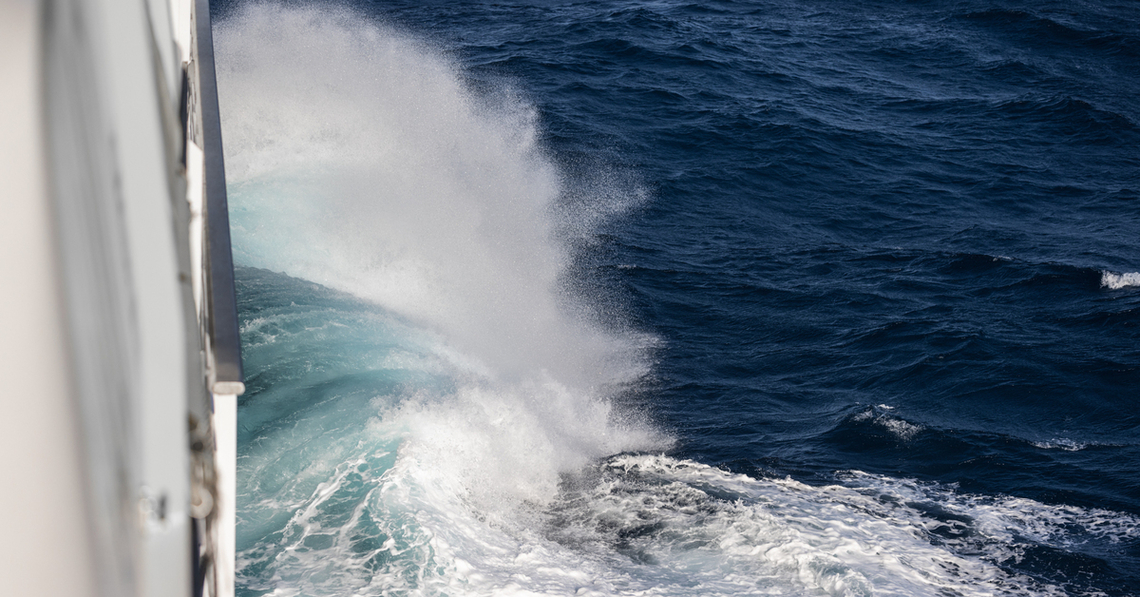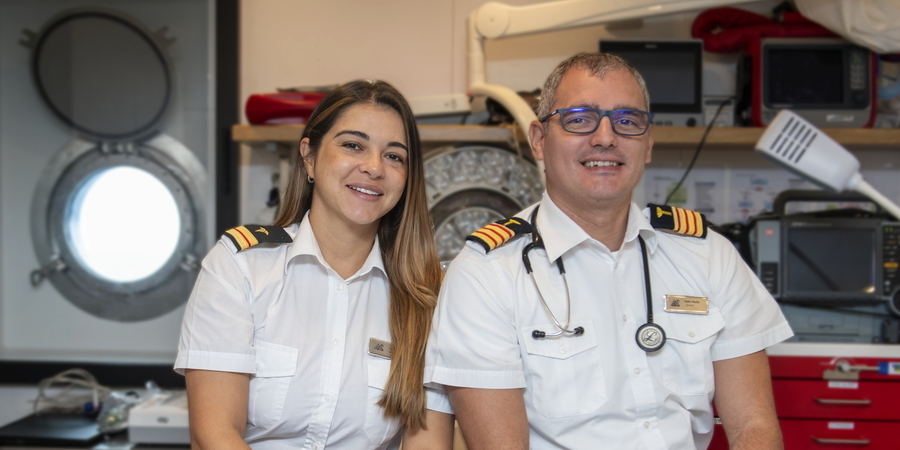Träumen Sie von einer Expeditionskreuzfahrt, aber Sie machen sich Sorgen, ob Sie seekrank werden könnten? Damit sind Sie nicht allein!
Viele Menschen sorgen sich bei der Planung einer Kreuzfahrt um Seekrankheit, doch die folgenden Informationen werden Ihnen Sicherheit geben. Mit dem richtigen Wissen und der richtigen Vorbereitung können Sie Seekrankheit vorbeugen, sie erkenne und behandeln – und so Ohr unvergessliches Abenteuer in vollen Zügen genießen.
Das Verständnis von Seekrankheit
Was ist Seekrankheit?
Seekrankheit ist eine Form der Reisekrankheit, die auftritt, wenn das, was Sie sehen, nicht mit dem übereinstimmt, was Ihr Innenohr wahrnimmt. Wenn Ihr Körper Bewegung spurt (zum Beispiel das Schaukeln des Schiffes auf dem Wasser), Ihr Augen diese Bewegung jedoch nicht wahrnehmen, kann dies zu einer sensorischen Verwirrung führen.
Wann es passiert, kann Symptome wie Schwindel, Übelkeit, Kopfschmerzen und Müdigkeit verursachen. Reisekrankheit kann in Autos, Zügen, Flugzeugen und sogar auf Fahrgeschäften auftreten. Glücklicherweise sind die meisten Menschen nicht stark dafür anfällig.
Seekrankheit tritt häufiger bei Kindern als bei Erwachsenen auf. In den meisten Fallen lasst die Empfindlichkeit im Laufe der 20er Jahre nach. Wenn Sie normalerweise keine Reisekrankheit haben, ist es unwahrscheinlicher, dass Sie sich auf See unwohl fühlen.

Der Umgang mit Seekrankheit
Swan Hellenic ist seit vielen Jahren auf den Weltmeeren unterwegs und hat daher Erfahrung mit Gasten, die gelegentlich unter Seekrankheit leiden. Doch wie kann man Seekrankheit auf einer Kreuzfahrt am besten vermeiden? Hier sind einige bewahrte Methode, um die Auswirkungen der Schiffbewegungen zu minimieren…
- Essen Sie leichte, regelmassige Mahlzeiten und achten Sie darauf, ausreichend Flüssigkeit sich zu nehmen. Auch Bewegung und frische Luft können helfen. Zudem ist es ratsam, gut ausgeruht zu sein, da Schlafmangel die Anfälligkeit für Seekrankheit erhöhen kann.
- Unseren modern Flotten aus 5-Sterne-Expeditionsschiffen verfügt über hochmoderne Stabilisatoren, die eine möglichst ruhige Reise gewährleisten. Falls Sie sich dennoch Sorgen um Seekrankheit machen, wählen Sie eine Kabine in der Mitte des Schiffes. Dieser Bereich ist am wenigsten von Bewegungen betroffen. Falls Sie sich unwohl fühlen, sollten Sie den Bug oder das Heck des Schiffes meiden.
- Eine weitere bewahrte Methode zur Linderung von Seekrankheit besteht darin, an Deck zu gehen und auf den Horizont in Fahrtrichtung zu blicken. Dies hilft Ihrem Gehirn, die Bewegung besser mit Ihren Sinneswahrnehmungen abzugleichen.
- Ein alter Seefahrertrick kann ebenfalls helfen, die widersprüchlichen Signale zu reduzieren, die Ihr Gehirn über die Bewegung des Schiffes empfängt: Setzen Sie einen Ohrstöpsel in ein Ohr ein. Dies tauscht das Gehirn und zwingt es, sich starker auf die visuelle Wahrnehmung zu konzentrieren. Es heißt, dass diese Methode am besten funktionier, wenn Sie das Ohr gegenüber Ihrer dominanten Hand verschließen (zum Beispiel das linke Ohr, wenn Sie Rechtshänder sind).
- Falls Sie sich unwohl fühlen, vermeiden Sie das Lesen, Fernsehen oder die Nutzung elektronischer Geräte. Zudem ist es ratsam, auf Alkohol sowie fettige oder stark gewurzte Speisen zu verzichten. Stattdessen sind milde Lebensmittel wie trockener Toast, Zwieback oder Cracker empfehlenswert.
- Auch ein Nickerchen oder Schlaf kann gegen Seekrankheit helfen. In Ihrer gemütlichen Kabine bekommen Sie weniger von der Bewegung des Schiffes mit, und das Schließen der Augen verhindert widersprüchliche Signale an das Gehirn. Sollten Ihre Symptome anhalten, steht Ihnen der Schiffsarzt jederzeit zur Verfügung.

Mittel gegen Seekrankheit
Wie kann man Seekrankheit auf einer Kreuzfahrt an besten vermeiden? Nun, wie bereits erwähnt, leidet nicht jeder unter Reisekrankheit. Falls Sie jedoch wissen, dass Sie anfällig dafür sind oder sich unsicher sind, empfehlen wir, von Ihrer Kreuzfahrt einen Arzt aufzusuchen. ER kann Ihnen das für Sie am besten geeignete Präventivmedikament empfehlen, sodass Sie bestmöglich vorbereitet in Ihre Reise starten können.
Auch Ihr Apotheker kann Ihnen rezeptfreie Mittel gegen Seekrankheit empfehlen. Achten Sie jedoch darauf, mögliche Wechselwirkungen mit anderen Medikamenten zu prüfen. Wenn es um die besten Mittel gegen Seekrankheit auf einer Kreuzfahrt geht, haben unsere Gaste mit verschiedenen Methoden Erfolg. Dazu gehören Seekrankheitspflaster (für die Sie ein Rezept von Ihrem Arzt benötigen), Tabletten und PSI-/Akupressur Bänder. Die Wirksamkeit diese Methoden variiert jedoch von Person zu Person. Denken Sie daran, Ihre Mittel gegen Seekrankheit im Handgepäck mitzufuhren und sie gemäß der Anweisung einzunehmen – in manchen Fällen bereits vor dem Betreten des Schiffes. Falls Sie vergessen haben, Medikamente gegen Reisekrankheit mitzunehmen, helfen wir Ihnen gerne weiter. Wenden Sie sich einfach an die Gästebetreuung an Bord, wo Seekrankheitsmedikamente erhältlich sind.
Viele Menschen schwören auf Seekrankheitsbänder, sodass sich eine Anschaffung lohnen konnten. Es gibt zwei Arten von Bändern: Sie wirken entweder durch Akupressur oder mittels eines Magnetfeldes auf einen Druckpunkt, der sich wenige Zentimeter oberhalb des Inneren Handgelenks befindet, und können so Übelkeit lindern.
Darüber hinaus gibt es einige natürliche Hausmittel, die helfen sollen, die Symptome der Seekrankheit zu mildern. Einige Gaste berichten, dass der Verzehr von Ingwer oder Pfefferminze – in verschiedene Formen wie Kapseln, Tee oder Bonbons – sehr hilfreich sein kann.
Häufig gestellte fragen
Ist es möglich, Seekrankheit auf einer Kreuzfahrt zu verhindern?
Ja! Sie können rezeptfreie Medikamente, Ingwer, Akupressur Bänder und die oben genannte Mittel nutzen, um Seekrankheit zu lindern. Die Wirksamkeit dieser Methoden variiert jedoch von Person zu Person.
Wie lange dauert Seekrankheit an?
Seekrankheit kann von wenigen Stunden bis zu mehreren Tagen andauern. Falls Sie zu Beginn Ihrer Kreuzfahrt unter Seekrankheit leiden, können rezeptfreie Medikamente sowie die in diesem Beitrag genannten Tipps helfen, sich innerhalb weniger Stunden oder ein bis zwei Tagen besser zu fühlen. In besonders raue See kann Seekrankheit langer anhalten, doch die meisten Menschen gewöhnen sich mit der Seit an die Bewegung des Schiffes – ein Phänomen, das als „See Beine bekommen“ bekannt ist, bei dem sich Ihr Gleichgewichtssinn an da Leben auf See anpasst.
Spürt man die Wellen auf einem Kreuzfahrtschiff?
In unruhiger See können Sie leichte Bewegungen spuren. Unsere modernen Schiffe sind jedoch so konzipiert, dass sie die Auswirkungen der Wellen minimieren, sodass Sie die Bewegung des Schiffes kaum wahrnehmen werden. Zudem sind unsere Schiffe mit Stabilisatoren ausgestattet, die ein möglichst ruhige und angenehme Fahrt gewährleisten.
Sind Kreuzfahrten für Personen mit Reiseübelkeit geeignet?
Mit der richtigen Vorbereitung und geeigneten Versorgemaßnahmen können Reisen mit Swan Hellenic auch für Menschen mit Reisekrankheit angenehm sein.
Wie kann man Seekrankheit Lindern?
Ausreichende Flüssigkeitszufuhr, leichte Mahlzeiten, frische Luft und die in diesem Beitrag genannten Mittel können dazu beitragen, Seekrankheit zu lindern.
